Only 16% of those surveyed by Fannie Mae in October said it was a good time to buy a home, and the percentage who said it's a good time to sell also fell, according to new data released Monday
New markets require new approaches and tactics. Experts and industry leaders take the stage at Inman Connect New York in January to help navigate the market shift — and prepare for the next one. Meet the moment and join us. Register here.
A survey-based index measuring homebuyer sentiment fell for the eighth month in a row in October to the lowest level in records dating to 2011, according to data released Monday by Fannie Mae.
Five of the six components tracked by Fannie Mae’s Home Purchase Sentiment Index fell from September to October, with a record low 16 percent of those surveyed saying it’s a good time to buy. The percentage who said it’s a good time to sell also declined eight percentage points from September, to 51 percent.
“Consumers are increasingly pessimistic about both homebuying and home-selling conditions,” Fannie Mae Chief Economist Doug Duncan said, in a statement citing “persistently high home prices and unfavorable mortgage rates” as drivers.
Duncan noted that Fannie Mae’s monthly National Housing Survey also showed that consumers, particularly homeowners, are increasingly concerned that home prices will fall. Although just 37 percent of consumers surveyed expect home prices to fall in the next 12 months, that’s a new survey high.
In their most recent forecast, Fannie Mae economists said they expect national home prices to decline by 1.5 percent in 2023, with home sales predicted to fall by 21 percent as Federal Reserve policymakers continue to struggle to get inflation under control.
“As continued affordability constraints reduce homebuyer demand, and homeowners become reluctant to sell at potentially reduced prices, we expect home sales to slow even further in the coming months, consistent with our forecast,” Duncan said of the survey results.
Fannie Mae’s Home Purchase Sentiment Index (HPSI) distills six questions from the mortgage giant’s monthly National Housing Survey of 1,000 homeowners and renters into a single number. Questions that are factored into the HPSI include whether consumers think it’s a good or bad time to buy or to sell a house, what direction they expect home prices and mortgage interest rates to move, how concerned they are about losing their jobs, and whether their incomes are higher than they were a year ago.
The only HPSI component that didn’t decline in October was the fear of becoming unemployed, with the percentage of respondents who said they were concerned about losing their job in the next 12 months falling to 15 percent.
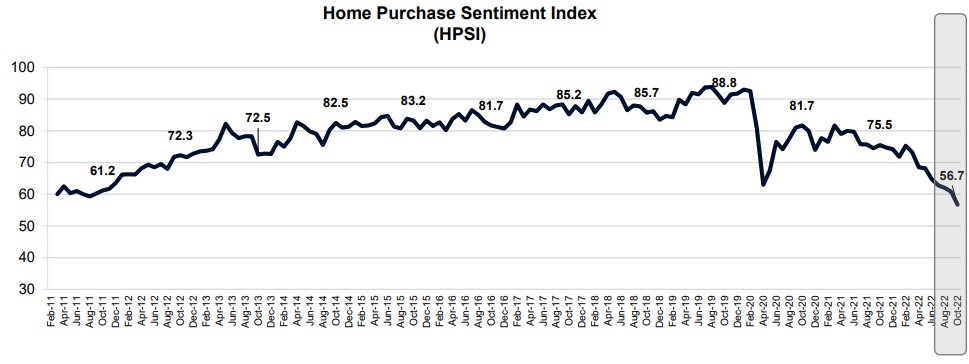
Source: Fannie Mae National Housing Survey, October 2022.
The HPSI fell 4.1 points from September to October and 18.8 points from a year ago, to 56.7 — the lowest reading in the index’s 11-year history.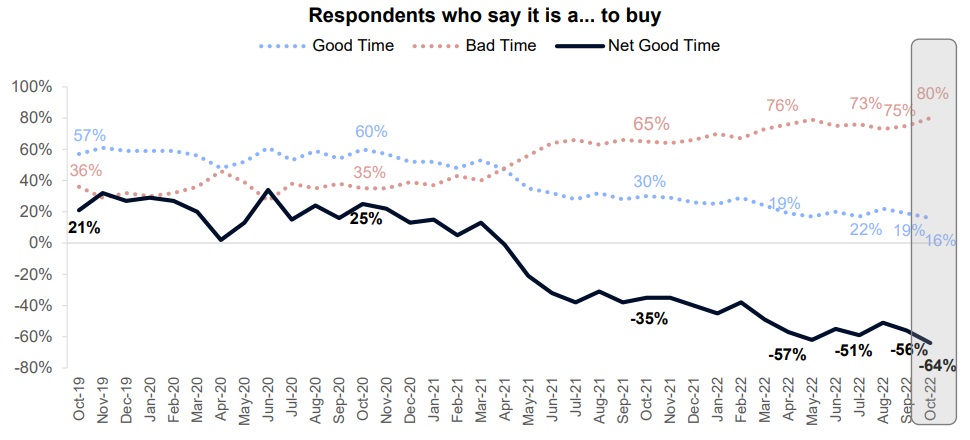
Source: Fannie Mae National Housing Survey, October 2022.
With the percentage of respondents saying it’s a good time to buy a home decreasing to 16 percent (a new survey low) and the percentage saying it’s a bad time to buy increasing to 80 percent, the net share of those who say it is a good time to buy decreased 8 percentage points from September, to -64 percent.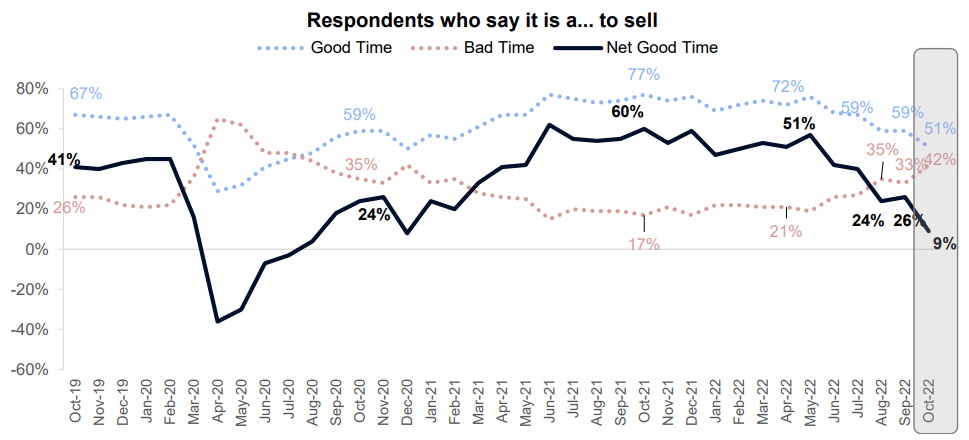
Source: Fannie Mae National Housing Survey, October 2022.
The percentage of respondents saying it’s a good time to sell also decreased to 51 percent, while the percentage saying it’s a bad time to sell increased to 42 percent. As a result, the net share of those who say it is a good time to sell decreased 17 percentage points from September, to 9 percent.
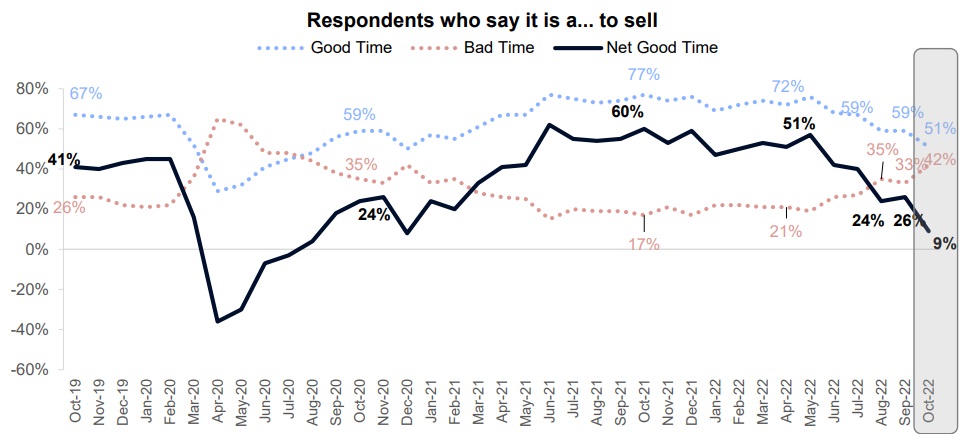
Source: Fannie Mae National Housing Survey, October 2022.
The percentage of respondents who expect home prices to go up in the next 12 months decreased to 30 percent, while 37 percent expect home prices will go down. With the share who think home prices will stay the same decreasing to 26 percent, the net share of survey respondents who expect home prices will go up decreased 4 percentage points from September, to -7 percent — the lowest level since May 2020.
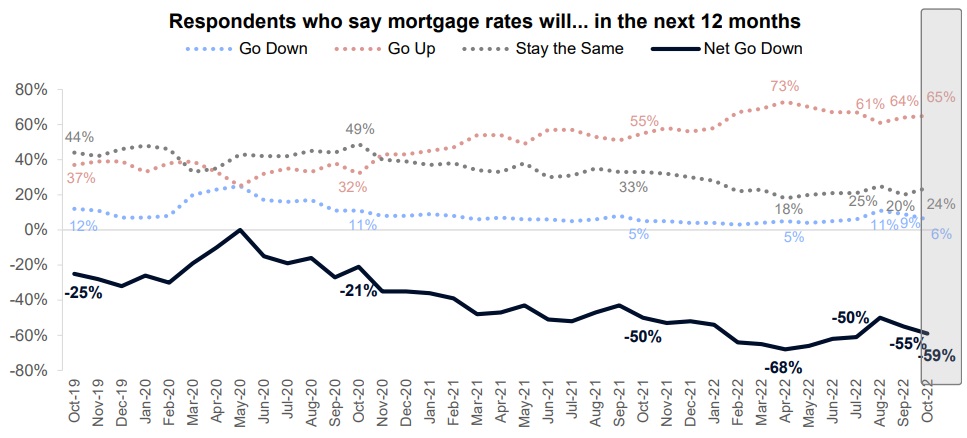
Source: Fannie Mae National Housing Survey, October 2022.
Some economists — including forecasters at Fannie Mae — think mortgage rates could come down a bit next year if the economy cools. But the survey showed only 6 percent of consumers share that view, with 65 percent expecting rates to climb in the next 12 months. With the share who think mortgage rates will stay the same increasing to 24 percent, the net share who think mortgage rates will go down over the next 12 months decreased 4 percentage points from September, to -59 percent.
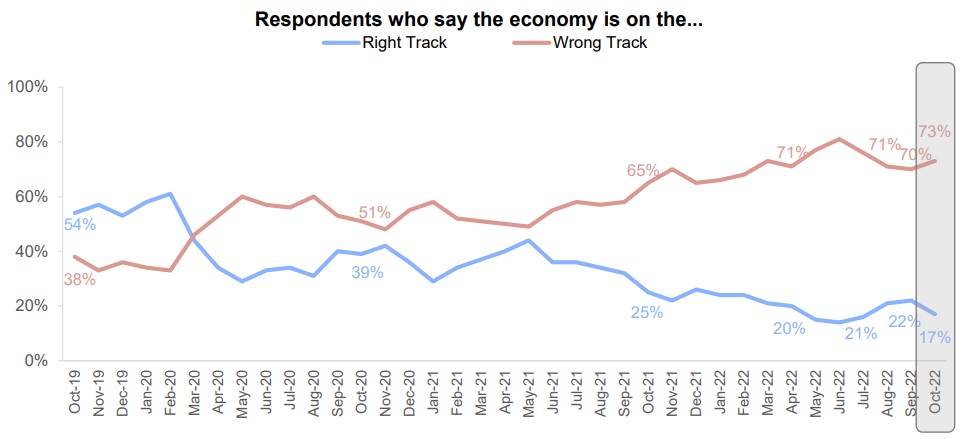
Source: Fannie Mae National Housing Survey, October 2022.
Although it’s not a question that’s factored into the HPSI, 73 percent of those surveyed said they think the economy is on the wrong track, up from 70 percent in September but down from a record high of 81 percent in June. The share who said the economy is on the right track decreased 5 percentage points to 17 percent.
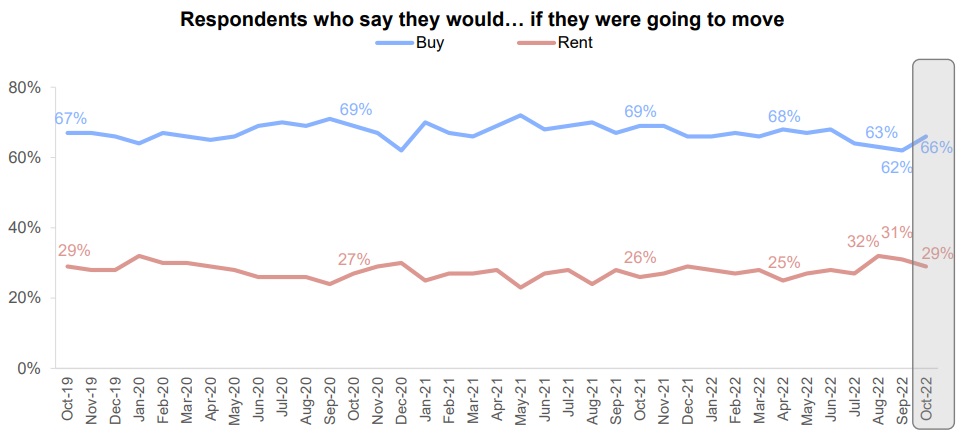
Source: Fannie Mae National Housing Survey, October 2022.
While the survey showed consumers are increasingly pessimistic about buying or selling a home, most would still rather buy than rent. Asked if they would buy or rent if they were going to move, 66 percent said they’d buy, up from 62 percent in September. Only 29 percent said they’d rent, down from 31 percent.
Nearly two-thirds of those surveyed (62 percent) said they expect rents will rise in the next 12 months, while only 6 percent believe they’ll fall.
Source: inman.com













